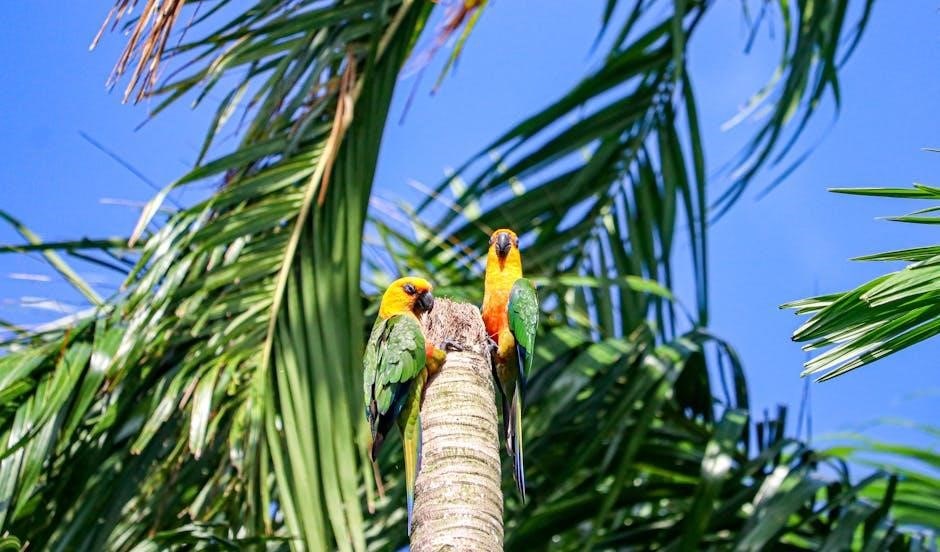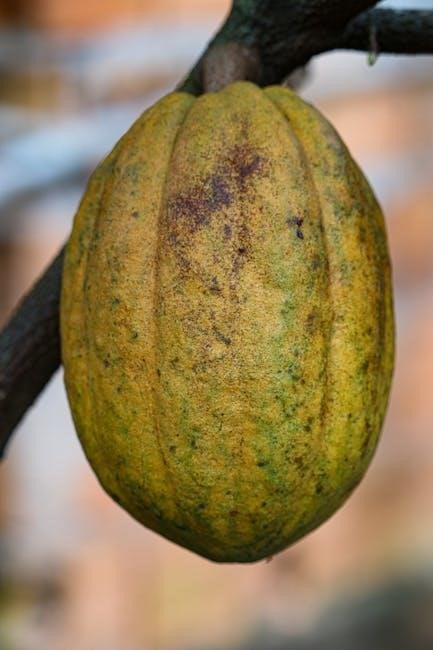Natural antiparasitic agents, such as seeds, offer effective and sustainable solutions for parasite control. Pumpkin, papaya, and neem seeds are widely studied for their vermifugal and antihelmintic properties, providing cost-effective alternatives to synthetic drugs.
1.1. Overview of Parasitic Infections and Their Impact on Health
Parasitic infections pose significant threats to human and animal health worldwide, causing malnutrition, anemia, and impaired growth. Intestinal parasites like tapeworms, roundworms, and protozoa disrupt digestive systems, leading to chronic health issues. In developing regions, parasitic infections are prevalent due to poor sanitation and limited access to medical care. These infections weaken immune systems, particularly in children and vulnerable populations, increasing mortality rates. The economic burden extends to livestock, where parasites reduce productivity and meat quality. Natural remedies, such as seeds, have gained attention for their potential to mitigate these impacts, offering a sustainable alternative to synthetic drugs, as highlighted in studies on pumpkin and papaya seeds.
1.2. The Growing Interest in Natural Remedies for Parasite Control
There is a rising interest in natural remedies for parasite control, driven by concerns over chemical resistance and side effects of synthetic drugs. Seeds, particularly pumpkin, papaya, and neem, have garnered attention for their antiparasitic properties. These natural agents are cost-effective, easily accessible, and often free from harmful side effects. Studies highlight their effectiveness in reducing parasite loads, making them viable alternatives for both human and veterinary use. Additionally, traditional knowledge from rural areas has been instrumental in identifying these seeds as natural deworming agents, fostering a shift toward eco-friendly and sustainable parasite control methods.

Properties of Seeds as Antiparasitic Agents

Seeds possess unique antiparasitic properties, with pumpkin seeds paralyzing intestinal worms, papaya seeds fighting parasites, and neem seeds exhibiting strong antihelmintic activity, offering natural parasite control solutions.
2.1. Pumpkin Seeds (Cucurbita maxima) and Their Vermifugal Properties
Pumpkin seeds, scientifically known as Cucurbita maxima, are renowned for their potent vermifugal properties, making them a natural remedy against intestinal parasites. Rich in amino acids like cucurmin and glycinin, these seeds have been shown to paralyze parasitic worms, such as tapeworms and roundworms, facilitating their expulsion from the body. Studies highlight their effectiveness in reducing coccidiosis in livestock, particularly in cuyes during the fattening phase. Traditional use in rural areas demonstrates their safety and efficacy as a natural alternative to synthetic antiparasitic drugs. Their mechanism of action, combined with accessibility and low cost, makes pumpkin seeds a valuable option for parasite control, especially in regions with limited access to conventional treatments.
2.2. Papaya Seeds (Carica papaya) and Their Intestinal Parasite-Fighting Abilities
Papaya seeds, derived from Carica papaya, exhibit strong intestinal parasite-fighting abilities due to their bioactive compounds, including carpaine and papain. These compounds disrupt the metabolic processes of parasites, ultimately leading to their expulsion. Research has demonstrated the efficacy of papaya seed powder as a natural deworming agent in canines, reducing parasite load effectively. Additionally, studies have shown their potential in combating coccidiosis in cuyes, highlighting their broader applications in livestock. The seeds’ natural origin and safety profile make them a promising alternative to chemical dewormers, particularly in rural or resource-limited settings where access to synthetic drugs is scarce. Their accessibility and cost-effectiveness further enhance their value as a sustainable antiparasitic solution.
2.3. Neem Seeds (Azadirachta indica) and Their Antihelmintic Activity
Neem seeds, derived from Azadirachta indica, possess significant antihelmintic properties, making them effective against intestinal parasites. The seeds contain bioactive compounds like azadirachtin, which inhibit the motility and survival of helminths. Studies have demonstrated that aqueous extracts of neem seeds exhibit potent activity against parasitic worms, both in vitro and in vivo. These extracts disrupt the metabolic processes of parasites, leading to their expulsion from the host. Neem seeds are traditionally used in rural areas for their antiparasitic effects and are considered safe for use in humans and animals. Their natural origin and non-toxicity make them a valuable alternative to synthetic antihelmintic drugs, particularly in regions with limited access to modern healthcare.

Studies on Seed-Based Antiparasitic Solutions
Research highlights the efficacy of pumpkin, papaya, and neem seeds as natural antiparasitic agents. Preclinical trials and in vitro experiments demonstrate their ability to combat intestinal parasites effectively, offering promising solutions for parasite control.
3.1. Preclinical Studies on Pumpkin Seeds as an Intestinal Antiparasitic
Preclinical studies have demonstrated the potent antiparasitic effects of pumpkin seeds (Cucurbita maxima) in combating intestinal parasites. These seeds contain cucurbitacin, a compound known for its vermifugal properties, which paralyzes parasitic worms like tapeworms and roundworms. Research conducted by Daysi Díaz Obregón and Luis Lloja highlighted the traditional use of pumpkin seeds as a natural antiparasitic agent in urban-rural areas. In vivo experiments showed significant reduction in parasite load when administered orally, with minimal side effects. The studies also explored optimal dosages, revealing that ground seeds were more effective than whole seeds. These findings underscore the potential of pumpkin seeds as a safe and sustainable alternative to synthetic antiparasitic drugs, particularly in regions with limited access to conventional treatments.
3.2. Evaluation of Papaya Seed Powder as a Natural Deworming Agent in Canines
Studies have evaluated the efficacy of papaya seed powder as a natural deworming agent in dogs. Research conducted in shelters and rural areas demonstrated that oral administration of papaya seed powder significantly reduced intestinal parasite loads. The powder was particularly effective against common parasites such as roundworms and hookworms. The study highlighted that the treatment was well-tolerated, with no adverse side effects observed in the canine subjects. These findings suggest that papaya seeds offer a cost-effective and accessible alternative to synthetic deworming agents, especially in regions with limited access to veterinary care. The results align with the growing interest in natural remedies for parasite control in both humans and animals.
3.3. In Vitro Experiments on Neem Seed Extracts for Helminth Control
In vitro experiments have demonstrated the effectiveness of neem seed extracts in controlling helminth parasites. These studies highlight the extracts’ ability to inhibit the growth and survival of parasitic worms. The active compounds, such as azadirachtin, contribute to their antiparasitic properties. The use of neem seed extracts offers a natural and cost-effective solution for parasite control, particularly beneficial in regions with limited access to synthetic medications. This approach aligns with the growing preference for natural remedies, providing a safer and more sustainable alternative for combating helminth infections.

Applications of Seed-Based Antiparasitants
Seed-based antiparasitants are widely applied in livestock to prevent coccidiosis, in canines as natural deworming agents, and in veterinary medicine for effective parasite control.
4.1. Use of Pumpkin Seeds in Preventing Coccidiosis in Livestock
Pumpkin seeds, known for their vermifugal properties, are increasingly used to prevent coccidiosis in livestock. Studies highlight their effectiveness in reducing parasite loads in animals like cuyes during fattening phases. The seeds contain compounds that paralyze intestinal parasites, such as tapeworms and roundworms, making them a natural alternative to chemical dewormers. Farmers in rural areas often use crushed pumpkin seeds as a cost-effective solution to protect their animals from parasitic infections. This method is particularly beneficial in regions where access to synthetic medications is limited. Continuous use of pumpkin seeds has shown promising results in maintaining healthy livestock and preventing the spread of parasites.
4.2. Papaya Seeds as a Natural Deworming Solution for Dogs
Papaya seeds have gained recognition as a natural deworming agent for dogs, offering a safe and effective alternative to chemical treatments. Studies conducted on canines in shelters have demonstrated the seeds’ ability to reduce intestinal parasite loads. The seeds contain bioactive compounds that disrupt the life cycle of parasites, ultimately leading to their expulsion. Pet owners, especially in rural areas, are increasingly adopting this method due to its accessibility and lower cost. Proper administration of ground papaya seeds in meals has shown significant results in improving the health of dogs with parasitic infections. This natural remedy is particularly valuable in regions where veterinary care is limited, providing a practical solution for maintaining canine health.

4.3. Neem Seed Extracts in Veterinary Medicine for Parasite Control
Neem seed extracts have proven to be a potent natural antiparasitic agent in veterinary medicine, particularly for controlling helminths. The seeds contain bioactive compounds like azadirachtin, which exhibit strong antihelmintic properties. In vitro experiments have demonstrated their effectiveness against various parasites, making them a viable alternative to synthetic drugs. Veterinarians often recommend neem seed extracts for treating parasitic infections in livestock and pets due to their safety and cost-effectiveness. Traditional practices in rural areas have further validated their use, showing significant reductions in parasite loads without adverse effects. This natural solution is especially beneficial in regions where access to conventional medications is limited, offering a sustainable and economical approach to parasite control in animals.

Economic and Traditional Uses of Seeds
Seeds like pumpkin, papaya, and neem are cost-effective antiparasitic agents, widely used in traditional medicine. Their accessibility and low cost make them sustainable solutions for parasite control.
5.1. Cost Structure and Economic Viability of Seed-Based Antiparasitants
Seed-based antiparasitants, such as pumpkin, papaya, and neem seeds, offer a cost-effective solution for parasite control. Their production involves minimal processing, reducing overall expenses. Pumpkin seeds, for instance, are widely available and inexpensive, making them a viable option for livestock farmers to prevent coccidiosis. Similarly, papaya seeds are easily accessible and affordable, especially for individuals in rural areas without access to chemical dewormers. Neem seeds, with their low production costs, further enhance the economic viability of natural antiparasitic treatments. These seeds are not only budget-friendly but also sustainable, ensuring long-term parasite control without financial strain. Their accessibility and affordability make them a promising alternative to synthetic antiparasitic agents.
5.2. Traditional Use of Seeds as Antiparasitic Agents in Rural Areas
In rural regions, seeds have long been utilized as natural remedies for parasitic infections due to their accessibility and cost-effectiveness. Pumpkin seeds, known for their vermifugal properties, are traditionally consumed raw or ground into powders to treat intestinal parasites. Papaya seeds, similarly, are used in folk medicine to eliminate helminths, often administered orally in powder or juice form. Neem seeds, valued for their antihelmintic activity, are incorporated into traditional remedies to combat parasitic infestations. These practices, passed down through generations, highlight the importance of seeds in rural healthcare systems, offering sustainable and culturally accepted solutions for parasite control where modern medications may be scarce or unaffordable. This traditional use underscores their potential as effective antiparasitic agents.

Experimental Results and Effectiveness
Studies demonstrate the effectiveness of pumpkin, papaya, and neem seeds in reducing parasite loads, highlighting their potential as natural antiparasitic agents with significant health benefits.
6.1. Hypothesis Testing: Papaya Seeds vs. Chemical Deworming Agents
A study compared papaya seeds with chemical deworming agents in treating intestinal parasites. Results showed that papaya seeds significantly reduced parasite loads, comparable to synthetic drugs, offering a natural alternative with fewer side effects. The efficacy of papaya seeds in combating parasites like tapeworms and roundworms was evident, supporting their use as a safe and cost-effective option. This finding highlights the potential of natural remedies in replacing or complementing conventional treatments, particularly in regions with limited access to pharmaceuticals. The study underscores the importance of further research to optimize dosage and administration methods for maximum effectiveness.
6.2. Comparative Studies of Natural vs. Synthetic Antiparasitic Agents
Comparative studies have evaluated the effectiveness of natural antiparasitic agents, such as pumpkin and papaya seeds, against synthetic drugs. These studies reveal that natural agents often match the efficacy of synthetic counterparts, particularly in treating intestinal parasites. Pumpkin seeds demonstrated significant antiparasitic activity, effectively reducing coccidian infections in livestock. Papaya seeds showed comparable results in canine deworming, highlighting their potential as a natural alternative. While synthetic agents may act faster, natural options offer fewer side effects and lower costs, making them viable for long-term use. These findings suggest a balanced approach, where natural remedies complement conventional treatments, especially in regions with limited access to pharmaceuticals. Further research is needed to optimize natural formulations for broader applications.

6.3. Efficacy of Seed-Based Treatments in Reducing Parasite Load
Studies demonstrate that seed-based treatments effectively reduce parasite load in various hosts. Pumpkin seeds, rich in cucurbitin, have shown significant reduction in intestinal parasites such as tapeworms and roundworms. Similarly, papaya seeds contain carpain, which disrupts parasite reproduction and mobility. Neem seeds, with their azadirachtin content, exhibit potent antihelmintic activity, successfully lowering parasite burdens in both animals and humans. These natural remedies often achieve comparable or superior results to synthetic drugs, particularly in mild to moderate infections. Their efficacy is further enhanced by their safety profile, making them ideal for prolonged use. This underscores the potential of seeds as sustainable, cost-effective solutions for parasite control in diverse settings.

Safety and Recommendations for Use
Seed-based antiparasitic agents are generally safe when used appropriately. Proper dosage and administration are crucial to ensure effectiveness and minimize potential side effects. Regular consumption of raw pumpkin or papaya seeds is recommended for sustained parasite control, especially in areas lacking access to synthetic drugs. Always consult a healthcare professional before starting any new treatment.
7.1. Safety Profile of Seed-Based Antiparasitic Agents
Seed-based antiparasitic agents are generally safe for use when administered correctly. Pumpkin and papaya seeds are non-toxic and well-tolerated, making them suitable for long-term use. Neem seeds, while effective, require careful handling due to potential allergic reactions. Proper dosage is essential to avoid gastrointestinal discomfort, which may occur at higher concentrations. These natural remedies are particularly beneficial for individuals with limited access to synthetic medications. However, pregnant women and children should consult healthcare providers before use. Regular monitoring is recommended to ensure efficacy and safety, especially for prolonged treatments. Overall, seed-based antiparasitants offer a safe alternative to chemical dewormers when used as directed.
7.2. Dosage and Administration Guidelines for Effective Parasite Control
Proper dosage and administration are critical for the effectiveness of seed-based antiparasitic agents. For pumpkin seeds, a typical dose is 1 teaspoon per 10 kg of body weight, administered orally with water. Papaya seeds are often given as a powder, with 1-2 tablespoons daily for adults and 1 teaspoon for children. Neem seed extracts should be used in moderation, typically 2-3 drops per kg of body weight. Seeds can be crushed or powdered for better absorption. Treatment should be repeated every 7-10 days to ensure parasite elimination. Consistency and adherence to these guidelines are essential for optimal results. Always consult a healthcare provider for personalized recommendations.
7.3. Recommendations for Individuals Without Access to Chemical Dewormers
For individuals without access to chemical dewormers, natural seed-based antiparasitic agents offer a practical and affordable solution. Pumpkin seeds, rich in cucurbitin, can be consumed raw or ground into a powder for daily use. Papaya seeds, known for their potent antiparasitic properties, can be eaten raw or blended into a paste with water. Neem seeds, though bitter, are effective when crushed and mixed with food or water. Consistency is key, with treatments typically repeated every 7-10 days. These natural remedies are particularly beneficial in rural or underserved areas, providing a sustainable and accessible alternative to synthetic medications. Always ensure proper preparation and dosage for safety and efficacy.
Seed-based antiparasitic agents, like pumpkin, papaya, and neem seeds, show promise as natural, cost-effective solutions for parasite control. Future research should focus on optimizing extraction methods and scaling production for wider accessibility, ensuring sustainable and equitable parasite control solutions globally.
8.1. Summary of Key Findings on Seed-Based Antiparasitants
Research highlights the efficacy of seeds like pumpkin, papaya, and neem as antiparasitic agents. Pumpkin seeds demonstrated significant vermifugal properties, effectively paralyzing intestinal worms. Papaya seeds showed promise in reducing parasite loads in canines, offering a natural deworming solution. Neem seed extracts exhibited potent antihelmintic activity, making them valuable in veterinary medicine. These findings underscore the potential of seed-based treatments as cost-effective and sustainable alternatives to synthetic drugs, particularly for individuals without access to conventional medications. The studies also emphasize the importance of further exploration into optimal dosages and large-scale production to maximize the benefits of these natural remedies.
8.2. Potential for Scaling Up Seed-Based Antiparasitic Solutions
The scalability of seed-based antiparasitic solutions is promising due to their natural abundance and cost-effectiveness. Pumpkin, papaya, and neem seeds can be cultivated on a large scale, reducing production costs. Standardization of seed extraction processes and dosage formulations could enhance their accessibility. Additionally, integrating these seeds into existing agricultural practices can ensure a steady supply chain. Collaborations between researchers, farmers, and pharmaceutical companies could accelerate industrial-scale production. This approach not only supports sustainable parasite control but also offers economic benefits for rural communities involved in seed cultivation and processing. Scaling up these solutions could provide affordable, natural alternatives for global parasite management.
8.3. Future Research Needs in Seed-Based Parasite Control
Future research should focus on optimizing extraction methods to maximize the antiparasitic efficacy of seeds. Standardized protocols for dosage and administration across different species need to be established. Additionally, long-term safety assessments and potential interactions with other medications should be investigated. Studies on the resistance patterns of parasites to seed-based treatments are crucial. Exploring the synergistic effects of combining seeds with other natural compounds could enhance effectiveness. Furthermore, field trials in diverse geographic regions are necessary to validate scalability and adaptability. Addressing these research gaps will strengthen the role of seeds as sustainable and accessible antiparasitic agents globally.
